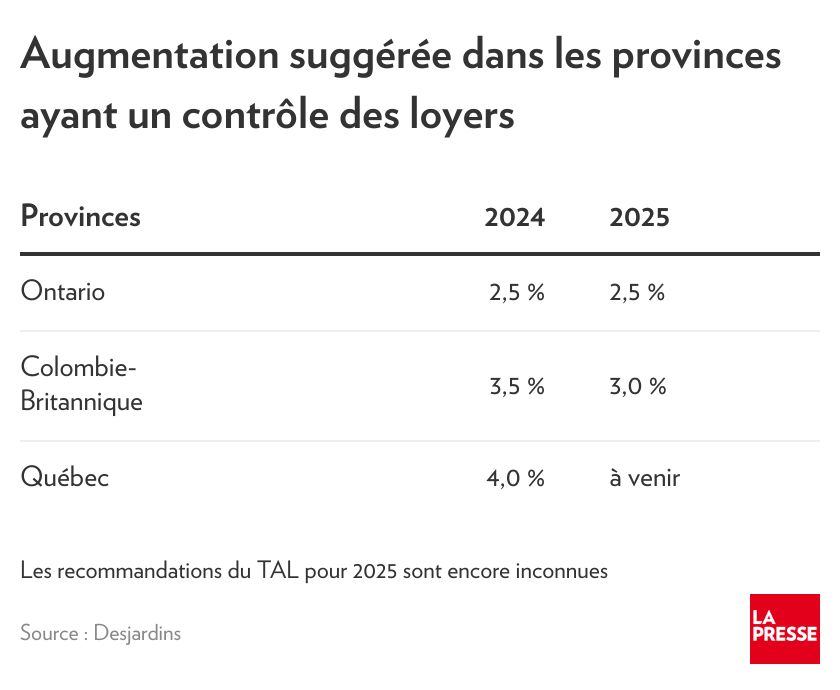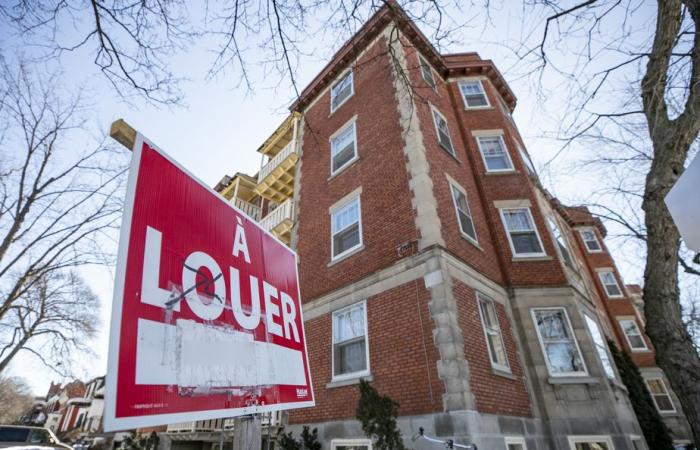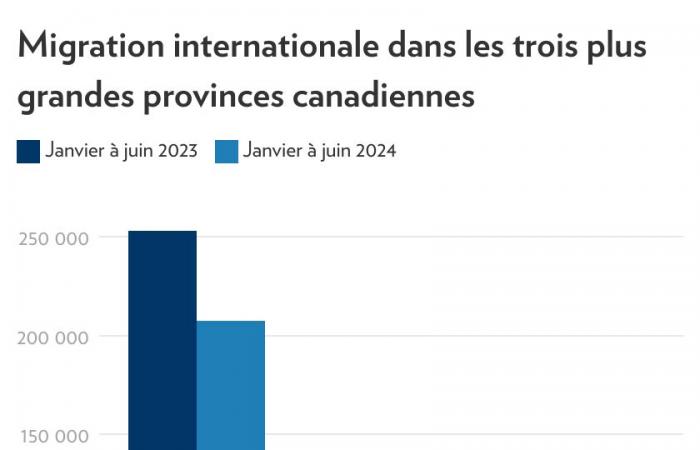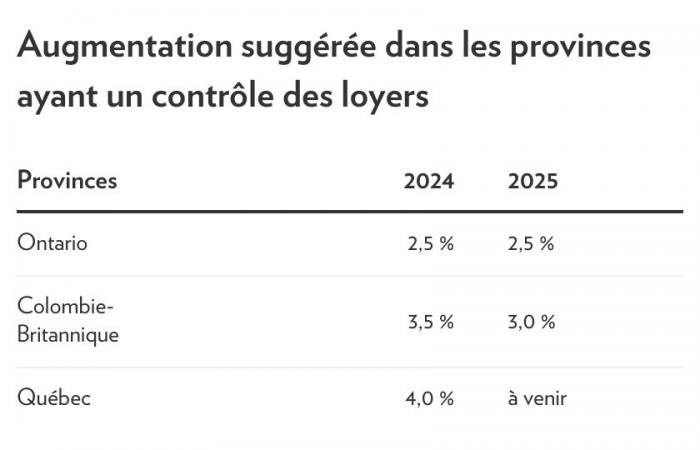Rent inflation is expected to be strong in Quebec next year, while it risks slowing down elsewhere in Canada, Desjardins economists anticipate in an analysis of the residential rental market. A prospect that will make the many tenants of the province who are already experiencing difficulties cringe.
Published at 5:00 a.m.
What you need to know
- Rent inflation is expected to remain high in Quebec in 2025 due to the calculation formula used by the Administrative Housing Tribunal.
- In Ontario and British Columbia, rent increases are expected to slow in the coming years following rising unemployment and downwardly revised population growth.
- With the number of renter households in the country having increased by 16% from 2018 to 2022, compared to only 1% of the number of owner households, it becomes essential to look at rent inflation to make a judgment on housing affordability.
« [Au Canada]we expect rent inflation to slow over the coming years, held back by rising unemployment and lower population growth,” reads the report released Thursday.
Starting with Alberta and Saskatchewan, where “rent prices are expected to slow the most quickly, given the highly cyclical nature of the economy and the rental market in these provinces.”
As well as in British Columbia and Ontario, where “rent inflation is expected to increase less quickly than elsewhere” in Canada with the reduction in the large number of new non-permanent residents who have established themselves in these provinces over the two recent years.
In Quebec, Desjardins economists anticipate, “on the contrary [des autres provinces]rent inflation is expected to remain high since rent increases permitted [par réglementation] are higher in Quebec than what is permitted in Ontario.”
According to the most recent figures available on international migration, the number of new arrivals continued to increase in Quebec in the first half of 2024, unlike Ontario and British Columbia.1.
Highest rate in Quebec
How much rent inflation can we expect in 2025? Undoubtedly beyond the rate of 4% recommended in 2024 by the Administrative Housing Tribunal (TAL) in Quebec, which would be double the capped rate in Ontario (at 2.5% from 2023 to 2025), economists anticipate of Desjardins according to the usual process of calculating the TAL based on the rent inflation rate of the previous year.
“The TAL’s recommendations for 2025 have not yet been published, but part of its calculation is based on the “rent” component of the consumer price index (CPI), the increase of which was 8, 3% during the third quarter of 2024,” report Desjardins economists.
Over the past two years, “the TAL had recommended an increase in rents of 1.8% in 2023, then double to 4% in 2024. This is an unprecedented leap in 30 years for buildings over five years. »
As a result, “a higher increase in rent inflation is expected in Quebec in 2025, unlike Ontario where the government limits rent increases to 2.5% for apartments built before 2019.”

A significant difference exists between the two provinces, however, underlines Francis Cortellino, analyst at the Canada Mortgage and Housing Corporation (CMHC). Rent control applies in Quebec even when there is a change of tenants in the accommodation, which is not the case in Ontario. Consequence: in 2023, the rent of housing that had a change of occupant had increased by 18% on average in Quebec, but by more than 30% in Ontario. CMHC will unveil its expected report on the state of the rental market in Canada in mid-December.
“The increases go well beyond the TAL estimate”
Called to comment on the Desjardins study, a group defending tenants’ rights believes that “we should not overestimate the effects” of the TAL’s recommendations.
“The rent for the majority of housing is not set by the Administrative Housing Tribunal,” underlines Véronique Laflamme, spokesperson for the Popular Action Front in Urban Redevelopment (FRAPRU). Those that are, are those for which tenants will refuse the proposed increase. »
In reality, the increases go well beyond the average TAL estimate.
Véronique Laflamme, spokesperson for FRAPRU
Then, the rent of new housing, she adds, escapes this court for the first five years.
According to the spokesperson, the solution involves what her organization has been asking for for a long time: more affordable housing and “stronger control mechanisms”.
A “different” year in the eyes of owners
For Martin Messier, president of the Quebec Owners Association (APQ), the first explanation for the higher increase in Quebec can be summed up in one word: catching up. “Rents in big cities tend to come together. People end up negotiating and then agreeing on something. »
Owners generally denounce the recommendations and the role of the TAL. Whether the recommended increases are higher in 2024 and possibly in 2025, “that’s different,” Mr. Messier cautiously acknowledges. “It breaks with our habits. »
However, he reminds that owners must always comply with rules that they consider dubious. For example, reductions in interest rates will have a perverse effect: the increases permitted for major work will be lower.
The president of the APQ recognizes, however, that everyone, owners and tenants alike, are suffering the repercussions of inflation. “We really have owners who are stressed, as I think this is a period of great stress for a lot of people. When you’re a tenant, your rent goes up, your groceries go up, everything goes up. »
Too expensive, the property becomes unpopular
The Desjardins study also highlights the loss of popularity of property, which has become a financial headache for many. The number of renter households increased by 16% in Canada from 2018 to 2022, compared to only 1% for owner households.
As a result, “the rapid rise in rents is having repercussions on a significant and growing share of households across the country”, particularly in Quebec and Montreal where almost half of households are renters.
With Megan Foy, The Press
1. Consult the article by The Press on new arrivals








